|
|
|
Sort Order |
|
|
|
Items / Page
|
|
|
|
|
|
|
| Srl | Item |
| 1 |
ID:
181644
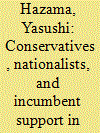

|
|
|
|
|
| Summary/Abstract |
To consolidate a predominant party system, an incumbent party will attempt to anchor voting behavior to social cleavages, a strategy called cleavage enclosure. However, does this strategy actually work? In Turkey, the incumbent AKP government has focused its campaigning on conservatives and nationalists. The analysis of the 2018 post-election survey reveals that the cleavage enclosure worked for conservatives but not for nationalists. Of the incumbent supporters in the previous election, conservatives replicated their support, whereas nationalists were less likely to support the incumbent than other identity holders. Nationalists tend to punish but not reward the incumbent party for its economic performance.
|
|
|
|
|
|
|
|
|
|
|
|
|
|
|
|
| 2 |
ID:
122517
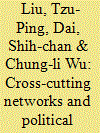

|
|
|
|
|
| Publication |
2013.
|
| Summary/Abstract |
This research examines whether public political participation in Taiwan is influenced by people's interactive relations and social environments. In contrast to the "sociodemographic factor" and "political mobilization" approaches used in previous studies of political participation, this paper's theoretical structure is that of "cross-cutting networks." It analyzes the influence exerted by social network "cross-pressures" on voters' engagement in political activities and their likelihood of voting in the 2010 mayoral elections in Taipei, Kaohsiung, and Taichung cities. The study uses national survey data to test the association between cross-cutting networks and political participation. The methodology adopted includes cross-tabulation analyses, ordered logit model, and logit model. The findings reveal that people in cross-cutting networks involving greater political disagreement are less likely to participate in politics while individuals engaging in homogeneous social interactions and under low-level cross-pressure are predisposed to participate more actively in politics.
|
|
|
|
|
|
|
|
|
|
|
|
|
|
|
|
| 3 |
ID:
123091
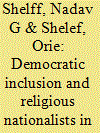

|
|
|
|
|
| Publication |
2013.
|
| Summary/Abstract |
NADAV G. SHELEF and ORIE SHELEF discuss the voting behavior of Israeli religious nationalists in the elections of 1999 and 2009. Their analysis suggests that the democratic inclusion of radical movements may not lead to moderation.
|
|
|
|
|
|
|
|
|
|
|
|
|
|
|
|
| 4 |
ID:
174789
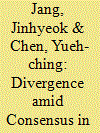

|
|
|
|
|
| Summary/Abstract |
This paper examines the nature of cohesive patterns of roll call voting behavior across international issues among the 10 member countries of the Association of Southeast Asian Nations (ASEAN) in the United Nations General Assembly (UNGA). Existing studies reveal a high level of foreign policy convergence among these countries. By incorporating several international issues, we set out to advance the scholarly understanding of the ASEAN states’ voting convergence in the UNGA. Our bill-level analysis of voting similarity in the post-Cold War period shows that the respective voting patterns vary across issues on arms control and disarmament, colonialism, economic development, human rights, nuclear weapons and nuclear material, as well as the Palestinian conflict. These findings highlight the ideas and interests of Southeast Asian countries across different foreign policy contexts.
|
|
|
|
|
|
|
|
|
|
|
|
|
|
|
|
| 5 |
ID:
179562
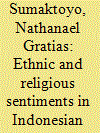

|
|
|
|
|
| Summary/Abstract |
Studies have documented how ethnic and religious sentiments shape the voting behavior of Indonesian Muslims. However, to date no studies have carefully measured the relative influence of these sentiments. I fill this gap in the literature by taking advantage of the candidacy of a Christian, ethnic Chinese candidate in the 2017 Jakarta gubernatorial election in Basuki Tjahaja Purnama (Ahok). Employing an original survey of Jakartan Muslims, I show through experimental and correlational analyses that Muslim voters are more opposed to Ahok than non-Muslim voters are and that this opposition is driven more by Ahok's ethnicity, as opposed to his religion. I also show that Muslim voters’ feelings toward ethnic Chinese shape their support for Ahok more than their feelings toward Christians. I discuss how these findings inform our understanding of the limits and extent of religious influence on Muslim voting behavior.
|
|
|
|
|
|
|
|
|
|
|
|
|
|
|
|
| 6 |
ID:
160630
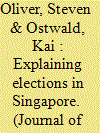

|
|
|
|
|
| Summary/Abstract |
The People's Action Party (PAP) of Singapore is one of the world's longest ruling dominant parties, having won every general election since the country's independence in 1965. Why do Singaporeans consistently vote for the PAP, contrary to the expectations of democratization theories? We argue that valence considerations—specifically, perceptions of party credibility—are the main factor in the voting behavior of Singapore's electorate, and are critical to explaining the PAP's resilience. Furthermore, we argue that the primacy of valence politics arose in part by design, as the PAP has used its control of Singapore's high-capacity state to reshape society and thereby reshape voter preferences towards its comparative advantages. We use a multi-methods approach to substantiate this argument, including a comprehensive quantitative analysis of recent elections. Ultimately, our findings suggest that a focus on valence politics can increase the resilience of dominant parties, but that such a strategy also faces natural limits.
|
|
|
|
|
|
|
|
|
|
|
|
|
|
|
|
| 7 |
ID:
184293


|
|
|
|
|
| Summary/Abstract |
The relationship between anxiety and investor behavior is well known enough to warrant its own aphorism: a “flight to safety.” We posit that anxiety alters the intensity of voters’ preference for the status quo, inducing a political flight to safety toward establishment candidates. Leveraging the outbreak of the novel coronavirus during the Democratic primary election of 2020, we identify a causal effect of the outbreak on voting, with Biden benefiting between 7 and 15 percentage points at Sanders’s expense. A survey experiment in which participants exposed to an anxiety-inducing prompt choose the less disruptive hypothetical candidate provides further evidence of our theorized flight to safety among US-based respondents. Evidence from 2020 French municipal and US House primary elections suggests a COVID-induced flight to safety generalizes to benefit mainstream candidates across a variety of settings. Our findings suggest an as-yet underappreciated preference for “safe” candidates in times of anxiety.
|
|
|
|
|
|
|
|
|
|
|
|
|
|
|
|
| 8 |
ID:
169030
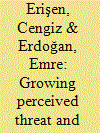

|
|
|
|
|
| Summary/Abstract |
Tolerance is a central concept for a society’s democratic foundations. Many forms of populism threaten tolerance and are a growing concern for consolidated liberal democracies as well developing ones. Right-wing ideology, heightened nationalism, and xenophobic rhetoric toward minorities are threatening social cohesion, public unity, and liberal values. Turkey, subject to various destabilizing recent events, faces specific challenges amid political, social, and economic uncertainties. Using two waves of a nationally representative survey, conducted after each of two general elections in 2015, we studied changes in the behavioral indicators of intolerance in the Turkish electorate. We found that perceived threat and prejudice explain changes in public intolerance during this period. We discuss the implications of our results for the standing of democracy in Turkey.
|
|
|
|
|
|
|
|
|
|
|
|
|
|
|
|
| 9 |
ID:
178783
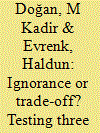

|
|
|
|
|
| Summary/Abstract |
Using data collected from an embedded survey administered to a nationally representative sample in Turkey, we test three common explanations for the re-election of corrupt politicians: Lack of Reliable Information, Efficiency Corruption Trade-Off, and Co-partisanship. We find that when voters receive reliable information that the incumbent mayor is corrupt, an electoral punishment (a decrease in the incumbent’s vote share in the coming elections) follows. This decrease, however, does not necessarily result in the incumbent being voted out, as we also find that many voters sufficiently value efficiency and co-partisanship in a corrupt politician to vote to re-elect.
|
|
|
|
|
|
|
|
|
|
|
|
|
|
|
|
| 10 |
ID:
152265
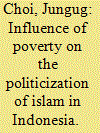

|
|
|
|
|
| Summary/Abstract |
This study deals with the influence of poverty as a socioeconomic cause of political Islam. Using Indonesian survey data, it explores how Muslims come to support Islamic political parties, and whether the variable of poverty or low income predicts politicization of Islam with other variables under control.
|
|
|
|
|
|
|
|
|
|
|
|
|
|
|
|
| 11 |
ID:
128943
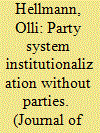

|
|
|
|
|
| Publication |
2014.
|
| Summary/Abstract |
Formally institutionalized party organization is usually considered a prerequisite for the development of programmatic linkages between parties and voters. However, in this article I show that political parties in South Korea have succeeded in stabilizing interparty competition through programmatic linkages without making any significant efforts to build a formal organizational base. In fact, it could be argued that South Korea is a "partyless" democracy, as political parties get easily captured by the interests of ambitious politicians, thus failing to establish themselves as independent actors. I therefore make a more general argument about the concept of party system institutionalization: we need to rethink the current practice of aggregating the different attributes of party system institutionalization into a single scale, as these attributes do not seem to be connected in a linear fashion.
|
|
|
|
|
|
|
|
|
|
|
|
|
|
|
|
| 12 |
ID:
182532
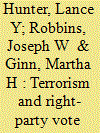

|
|
|
|
|
| Summary/Abstract |
This study examines the electoral consequences for ideologically right-leaning political parties in the wake of terrorist attacks by employing an original dataset that captures political party vote shares and multiple terrorist indicators. Our analysis extends the partisan voting hypothesis to 56 democracies from multiple regions and levels of development between 1975–2014. Specifically, we find that the origins of terrorist perpetrators, the severity of terrorist attacks, and the frequency of terrorist incidents decrease right-party vote shares in legislative contests when incorporating standard controls. All told, these findings reinforce political psychological reasoning that contends terrorist attacks impact citizens’ emotions and voting calculations.
|
|
|
|
|
|
|
|
|
|
|
|
|
|
|
|
| 13 |
ID:
185496
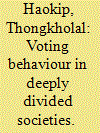

|
|
|
|
|
| Summary/Abstract |
Voting patterns in the hills of Manipur show high ethnic voting indicating extremely partisan attachments. The salience of ethnicity in voting preference is reinforced by conflicts in the past. Periodic elections only exacerbated such divisions through partisan mobilisation and competition for representation along ethnic lines. Cross-ethnic voting is prevalent among groups wherein cousinage alliance cannot be forged due to past conflicts. The neck and neck competition for political representation among ethnic groups has sidelined the democratic rights of individuals over partisan group interests. In such deeply divided societies ensuring individual rights is the challenge of democratic governance, and the only viable solution to this pervasive problem appears to be a constitutional reform with the aim of having a more inclusive representation.
|
|
|
|
|
|
|
|
|
|
|
|
|
|
|
|
| 14 |
ID:
113201


|
|
|
|
|
| Publication |
2012.
|
| Summary/Abstract |
In 2004 and 2009, the incumbent central governments in India enjoyed a high level of voter satisfaction. Why then did incumbents lose elections in 2004, while winning them in 2009? The different electoral outcomes can be explained by a combination of satisfaction with a constituent's member of Parliament and the performance of the government at the state level, as well as satisfaction with the government at the national level. This analysis rejects the conventional argument of general satisfaction with the performance of the central government as being the determinant of electoral outcomes in national elections.
|
|
|
|
|
|
|
|
|
|
|
|
|
|
|
|
| 15 |
ID:
190691


|
|
|
|
|
| Summary/Abstract |
Why do voters accept clientelism? Previous research suggests that poorer voters are more likely to accept clientelistic benefits. However, identities may moderate the effect of poverty through identity-based economic comparisons across groups. The role identity plays in partisanship, and dense ethnic identity networks may make it easier for parties to enforce clientelism among specific groups. This paper presents evidence from a survey experiment in Turkey to argue that politicized Kurdish ethnic identity, combined with heightened perceptions of relative economic deprivation, explains why certain voter groups are more likely to accept clientelism. Additionally, experimental evidence shows that support for clientelism may depend on the quality of benefits rather than quantity. Focusing only on the amount of resources or the recipients’ economic conditions may fail to explain why certain voters accept clientelism more in the Turkish context.
|
|
|
|
|
|
|
|
|
|
|
|
|
|
|
|
|
|
|
|
|